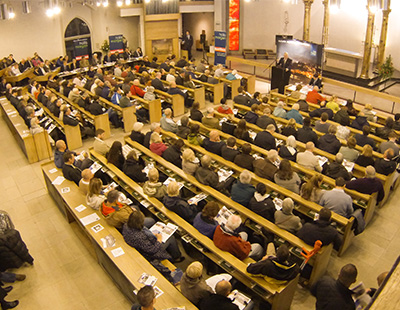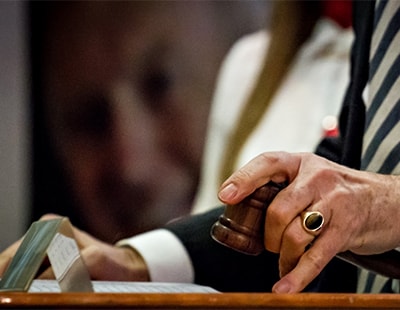Bond Wolfe
Gurpreet Bassi, chief executive of Bond Wolfe Auctions, one of the UK’s most successful regional auction companies, says the firm will be back in the room – ‘but only when it is completely safe to do so and there are no restrictions on distancing, mask wearing required, etc’.
And this is in spite of the fact that Bond Wolfe’s most recent auction was the ‘UK’s most successful live-streamed auction’, raising over £30.2 million. The auction was also the largest ever held outside of London, with a total of 205 lots sold from 218 offered, representing a success rate of 95%.
The auction generated unprecedented interest, Bassi said, with 814,817 website page views, 161,168 video tours watched and 34,336 tuning in to watch the auction live on the day.
The catalogue for the next auction – which actually takes place today (May 19) – has 236 lots, another record, but Bassi misses the buzz of the auction room and believes his hardcore property dealers do, too.
“Livestreamed auctions have been unbelievably successful for us. I could not have imagined it could have gone so well,” he said.
“But on both sides of the rostrum we miss the sound of an auction, the buzz in the room, the networking and the dealing that goes on in person and virtual auctions cannot replicate that. The future is a hybrid version with our regular clients from London and Hong Kong, for example, still bidding online and by telephone, and everyone can choose.”
Bassi added that it was still too early to say when a full return to the room would be possible.
“Sometime after 21 June we hope, but it could be the autumn or perhaps early next year,” he said. “What we do know is that we will only open the doors when it is completely safe to do so.”
And he anticipates even greater success to come for Bond Wolfe Auctions when on-site viewings become easier to manage.
“The future is much brighter. For the auction business, it is very much brighter,” he predicts.
Pugh
Paul Thompson, managing director of Pugh & Co, one of the UK’s leading auction firms, says it is difficult to comment on the future at the moment as the market is constantly evolving and there are ‘still wider market uncertainties’.
“The chances are that there will be an eventual return to in-room auctions when the government allows it, but they will perhaps run in parallel with people being able to bid online and over the telephone,” he said. “With regards to us at Pugh returning to in-room auctions, it’s something we’ll look at when things become clearer as to what’s possible and when.”
Will Pugh eventually operate a hybrid model, to offer the best of all worlds? “At the moment, this is still undecided. We are very much taking the lead of the wider market and, as things stand, online auctions are still the preferred method for us,” Thompson claimed.
“Once there is a little more certainty around the current situation and if there is a demand for a return to room auctions, we will then look to review what our future model will look like.”
Thompson says Pugh’s switch to online at the start of the pandemic was easy, as the firm had been running successful online auctions for over a year before the pandemic.
“We were happy to face up to the challenge of switching our room auctions online because we had the confidence of having a successful and proven solution in place,” he said. “While there was an initial impact on the business at the start of the pandemic in terms of property flow, we’ve seen a dramatic recovery over the past year and are back to where we were pre-Covid.”
He added: “The market has also risen to the challenge and embraced the online auction format and it’s now a larger part of the ever-growing auction sector for both buyers and sellers.”
But has there been a clamour from clients and regular auction-goers to return to the buzz of the auction room, or are people actually much happier with the convenience and flexibility of the virtual process?
“I think until room auctions are an option for people and large gatherings are up and running with government approval and proven safety measures in place, it’s difficult to gauge wider opinion,” Thompson stated.
“There certainly are benefits to online auctions, which is why we were already doing them pre-Covid, but since lockdown it's really taken off and I think there will be people who opt to stay with online.”
He added: “That said, there are others who really value the in-room interaction so it’s difficult to say which takes preference as different clients have different needs.”
Clive Emson Auctioneers
James Emson, managing director of Clive Emson Auctioneers, one of the UK’s top five property auctioneers, says there are no immediate plans to hold ballroom auctions in the next few months.
“This is partly due to the fact we still don’t know what restrictions there will be, even following the government’s current roadmap,” he said.
“Also, with public auctions, it is impossible to gauge the exact attendance numbers and therefore, if we are limited on capacity, it would mean turning away potential buyers, resulting in less buyers in the room and removing one of our core values, transparency.”
He added: “Furthermore, with social distancing, signed contracts and taking IDs and payments would be difficult in an enclosed room, potentially putting attendees and staff at risk.”
There are further potential complications, too. “With a number of properties (for example, ground rents), we have to serve a Notice stating the venue in which it will be sold,” Emson explained. “These are typically served four months before auction and, if any sudden changes are made by the government, it would be impossible to predict where we will be by autumn.”
However, subject to the success of the vaccine rollout, Emson believes there is hope the auction house can return to in-person auctions in 2022.
Like Pugh, he says Clive Emson was ready for a quick switch to online. “As a tech-progressive business, we were well prepared to switch fully to online auctions during the pandemic – many bids were already being made digitally at our in-person auctions.”
He continued: “One of the main areas we focused on was helping prospective purchasers transit to the online model - for many this was a new way of carrying out property transactions. Months on, it has become second nature to a great number of repeat bidders.”
This, he insists, is evidenced by the company’s most recent May 2021 auction, which recorded £21 million in sales, with 135 lots listed, and a success rate of more than 80%.
“One thing has shown the true resilience of auctioneers, sellers and buyers alike within the property market - the ability to adapt to changing conditions or restrictions,” Emson concluded.
Strettons
When asked about whether in-room auctions will return when allowed, Andrew Brown, director of auctions at Strettons, said: “I think it is probably a little too early to make this decision yet. Ultimately, this decision will have to be client-led. The feedback we’ve had is that people are comfortable with remote sales and our strong results prove that we can operate well digitally.”
He added: “When in-room auctions are allowed again, I’m not convinced that everyone would necessarily rush to attend. They may not be confident in attending a mass event such as an auction or they have got more used to buying and selling digitally. We will need to assess what the appetite is from our clients.”
Brown says there will have to be a compelling reason to return to the ballroom, with nostalgia and enjoyment of the event not a good enough reason.
“Our job is to get the best price for our clients, and it will then be up to auctioneers to decide which is the best way to achieve that, digitally or in the ballroom,” he commented.
The team at Strettons has responded well to the change to digital auctions, with its clients liking the live-streamed sale approach. “Overall, we have had a good twelve months, selling over £90 million worth of property with a 92% success rate,” he said.
He believes the industry as a whole has responded well to the auctions world moving online during the pandemic and thinks there will be a difference of opinion when it comes to whether people prefer an in-room or virtual sale.
“Virtual auctions have lessened the overall ‘theatre’ of the auction day and many people do miss that, no-one more so than me. I also really miss the interaction between buyers and sellers,” he said.
“Ballroom sales provide the opportunity to network, meet people and catch up with clients. This is something that is much harder to replicate digitally.”
He continued: “That said, now that auctions have moved online, we have a much wider net of potential buyers. I think that not being in an auction room full of seasoned bidders has also made the process less intimidating for new bidders and this has given people more confidence to buy at auction.”
He thinks it’ll come down to personal preference for many auction-goers, ‘but as auctioneers, we are here to achieve the best price for our clients. It’s our knowledge of our clients which will help us to decide which is the best way to do that, digitally or in the ballroom’.
Moving forward, Strettons may consider combining both approaches, catering to the preferences of a wider range of sellers and buyers.
“The successful response of auctions to the pandemic has taught us to be bold, creative and ‘to think outside the box’ in order to capture and retain a wider market,” he concluded.
Auction House
One of the UK’s biggest property auctioneers, Auction House, believe that the face of auction property sales has been changed forever, regardless of what happens to the easing of lockdown restrictions in the coming weeks.
The group’s new managing director, Jeremy Prior, says that the Covid pandemic forced rapid change in the industry, with some of the new ways of working likely to remain in place forever.
“Let’s face it, the room-only model of property auctions has been consigned to history. Regardless of the state of the pandemic or the lifting of restrictions in the future, no auctioneer worth their salt will be staging a sale where the only option for buyers will be to turn up in person,” he claimed.
“At the very least, auctions will be hybrid affairs, where room proceedings are also streamed live online. But frankly, it’s an open question as to whether some of our members will decide that because livestream sales have been so successful, there’s simply no benefit being in the room anymore.”
He added: “Even die-hard fans of room auctions are in two minds about whether to go back to the room, because the effectiveness of livestream sales has been so phenomenal!”
Prior’s comments follow Auction House’s 1,000th sale this year – a three-bedroom terraced house in Bere Alston, Devon, which was guided at £138,000 but which sold for £155,000, after some fierce bidding in the Devon & Cornwall auction on April 29.
“What’s incredible is that despite lockdown, and despite all the restrictions we’ve been under, Auction House has continued to sell more properties than any other UK auctioneer,” Prior explained.
“And, of course, this figure has been achieved almost exclusively for our private sellers - because we have been without our usual stock of repossessions from corporate clients, while the courts have been closed during the pandemic.”
He said the surge in activity means that Auction House is now expanding its digital team. The company has already hired a digital content creator and a new digital marketing assistant and digital events technician will be on board soon, Prior says.
“Even though we were used to carrying out livestream auctions in the past, they had previously been combined with room sales. In fact, when the first lockdown came into place last year, the pandemic forced us to make around eight years of technical advances in as little as eight weeks,” Prior continued.
“The way that the scheduled dates fell, the team at Auction House London were the first to hold a livestream-only sale on March 25 last year – just two days after the lockdown was imposed. And they’ve never looked back!”
However, Prior claims it’s not just the industry that’s had to change. “Our customers have had to adapt, too – and once again, technology has come to the rescue. Virtual tours have enabled many to purchase without even going inside the properties they are buying,” he said.
“So, I’m incredibly proud of our teams around the country for the flexible way in which they have coped during the Covid crisis,” he added.
“The whole sector is unrecognisable from what it was like a year and a half ago. And now that those changes have had time to bed-in, I can confidently predict that many of them will be with us forever.”
Network Auctions
Toby Limbrick, property auctioneer and owner of Network Auctions, has seen his outlook on the future of auctions change in the last year and a bit.
When asked about whether or not Network Auctions would be returning to in-room auctions when the time allows, he said: “In March 2020, my answer would have been a resounding ‘yes’, once restrictions ease. Now, 15 online auctions later, it’s ‘no’. In the last 14 months we have seen an uplift of 40% sold lots compared to our pre-pandemic numbers.”
He added: “Bidder registrations have skyrocketed and that’s not due to the stamp duty holiday, but the acceptance of online. Geography no longer matters when you have access to the internet. Buying online is simple and convenient, and that now extends to properties.”
He said the ability to auction property online means the company can cater for many more interested parties than it could fit in any real-world auction room, while the technology allows for every bid to be recorded. “This means the process is more transparent and accountable,” Limbrick said.
Has he seen any clamour from clients for the return of the in-room buzz? “Clients love a day out and the buzz of the auction room, but what they love more is the best hammer price,” he insisted.
“Conducting the auction online has meant we can attract people from all over the world – literally. The more competition for a property, the higher the price.”
He added: “Where before the idea of buying property online seemed a ‘stretch too far’, the pandemic has changed the way people think and behave. Buying bricks and mortar at the click of a button is now accepted as a mainstream method.”
Limbrick said the convenience of not having to attend an auction means Network Auctions is now attracting even more bidders and this is reflected in its sales results.
SDL Property Auctions
Andrew Parker, auctioneer and managing director at SDL Property Auctions, said in March last year the brand made the quick decision to move all of its room auctions ‘behind closed doors’ and host them purely online.
“We were well-placed to make this move, though, as we’ve always accepted internet, phone and proxy bids and had been live-streaming all our auctions already, so had the infrastructure in place,” he said.
“We were delighted by the success and since then, the format has continued to be very successful for our buyers and sellers. So much so, our March 2021 results indicated that sales were up by 184% – marking our most successful March yet, all through a combination of live-streamed auction events, timed auctions and ‘Buy It Now’ sales.”
Parker said it’s difficult to predict what the future will hold for auctions and the property market as a whole.
“I have no intention to fully return to the amount of room auctions we used to run, but I’m sure it will be similar across the sector, in the same way that many people are now looking for more flexibility with working from home policies,” he said.
“Prior to lockdown, at least 20% of our bids were already placed remotely, so it just accelerated the format and allowed us the time to practice the way we delivered online sales.”
He went on: “Of course, there are benefits to physical auction rooms, such as the social and networking elements, as well as the ‘buzz’. That’s why we always live-broadcast our auctions so anyone from anywhere can feel part of the experience.”
As the auctioneer, he says he can see the bids coming in and together everyone can still create the competitive bidding environment that makes auctions so successful.
“In place of the networking, separate events for property investors that offer more than the fundamental auction experience is something we’re looking to develop,” he added.
He argues customers have been very receptive to the change to online-only, which has been reflected in the firm’s figures.
“Over the past year, we’ve raised 53% more than the same period in 2019. There will always be appetite from investors and the ease of accessibility has benefited everyone,” he said.
“Combined with our familiar auction experience, live-streamed auctions appear to be a winning formula that people are very comfortable with and we’re proving that auctions remain the best method for achieving the best prices for sellers in today’s market.”
Sutton Kersh
James Kersh, auctions director at Liverpool-based Sutton Kersh Auctions, says his company has been successfully hosting large ballroom auctions, often with around 500 people attending, for many years.
“For those who could not make it, we would offer the option to bid for them by phone or proxy. When the pandemic hit, our first auction was due to take place in April. We decided to test the water, change our business model and make the move to online, instead of cancelling it, and we have not looked back,” he said.
“To our surprise, the take-up has been phenomenal. We have had hundreds of bidders register for each online-only auction and they have also been watched by hundreds of people across the country.”
He added: “We do, however, miss the buzz in the room of live ballroom auctions; especially the bidding wars, which we usually get plenty of.”
He says Sutton Kersh’s decision to return to ballroom auctions will be based around two criteria - the Covid-19 restrictions being lifted, ‘so that we can operate a room safely’, and customer demand for people wanting to physically attend the auction room.
“We can see the possibility of a hybrid model because many people have got used to the idea of being able to bid online and it has meant we have been able to widen our reach to investors worldwide, not just in the UK,” Kersh said.
“However, I do feel that live in-room auctions will play a part again in the future, as bidders often like to get a sense of the market, gauge the interest of certain lots and see who they are up against more easily.”
“Also, we have found that if a buyer has come for a specific lot and been unsuccessful, they may ask the on-hand team the relevant questions, view legal packs and then bid on other lots. This is something which we have not seen much of through the online-only auctions.”
Mark Jenkinson & Son
Adrian Little, senior partner and auctioneer at Sheffield-based Mark Jenkinson & Son, says the success of virtual auctions has left him torn.
“There is no question that the huge success of our nine online auctions since the first lockdown last March has presented me with a dilemma, both personally and from the company's perspective,” he commented.
“The auction is an institution in Sheffield, with our regular clients meeting for a catch-up over lunch, which we have been providing for over 30 years. This environment allows for business to take place between solicitors, bankers and agents, with the auction serving as a thermometer for the current state of the market. It provides a valuable snapshot of the market that can give builders, developers, and investors’ confidence or caution them in more difficult times.”
He added: “After a steep learning curve, we are now settled into the routine of hosting our auctions online, and we have seen property prices increase by 9% on the previous year, resulting in some very happy clients.”
He said the last sale drew buyers from as far as Maidstone and Carlisle, ‘showing just how much the market is opening up’.
“Recently, a friend told me he had bid for a property in Sheffield whilst in a canoe on Lake Windemere, just one example of how online auctions are working well for buyers,” Little continued.
“The clients' best interest is the deciding factor in my choice between continuing with online auctions or returning face-to-face. At this point, online auctions are in the lead. Still, you cannot replace the experience and knowledge gained from decades of inspecting thousands of potential lots.”
He concluded: “Advice and professionalism lead clients down the right path, and the computer is there to assist in that, not replace it, so I remain an auctioneer because there is more to my job than a few hours on the rostrum each month.”








.png)










Join the conversation
Be the first to comment (please use the comment box below)
Please login to comment